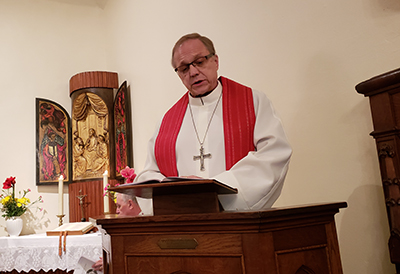
ELMDF Bishop Risto Soramies preaches during matins.
BELGIUM – The second day of the ILC’s 2018 World Conference (September 26) began with a service of matins and a commemoration of the martyrs Johann Esch and Heinrick Voes. Esch and Voes were Augustinian monks who had converted to Lutheranism along with the rest of their monastery in Antwerp. For this crime, Esch and Voes would become the first Lutheran martyrs when they were burned at the stake in Brussels on July 1, 1523.
Bishop Risto Soramies of the Evangelical Lutheran Mission Diocese of Finland (ELMDF) preached for the service, reflecting both on the Belgian martyrs Esch and Voes and the lesser sufferings we too face as Christians. “Most of us bear lighter crosses than brothers Johann and Heinrich,” he noted. “Nevertheless the enemy of our souls is trying and tempting us in many ways. But we do not have to resign and grow weary or even be sad or sorry. Through Jesus we are God’s people, beloved, forgiven and upon us rests God’s glory, hidden to human eyes, including ours, but seen by the angels.
“Therefore,” he concluded, “let those who suffer according to God’s will entrust their souls to a faithful Creator while doing good.”
The message took on particular poignancy for those who know Bishop Soramies’ own story: he, along with several other pastors in the ELMDF, were defrocked by the state church in Finland as a result of their faithfulness to the authority of Scripture.
The service was held in Antwerp’s Holy Trinity Lutheran Church
Following matins, Rev. Isaiah Obare of the Evangelical Lutheran Church in Kenya presented a Bible study delving deeper into the subject of martyrdom.
Confessional Ecumenism in history and in the current moment
During the morning, the conference heard a report on the ILC’s 2017 incorporation and the bylaws adopted by the ILC Executive Committee at that time. The elevation in legal status better equips the ILC, as the bylaws themselves state, “to enable its further growth and development in the worldwide service of Confessional Lutheranism.” Later in the afternoon, the conference voted to accept the bylaws and commend the Executive Committee for their work.
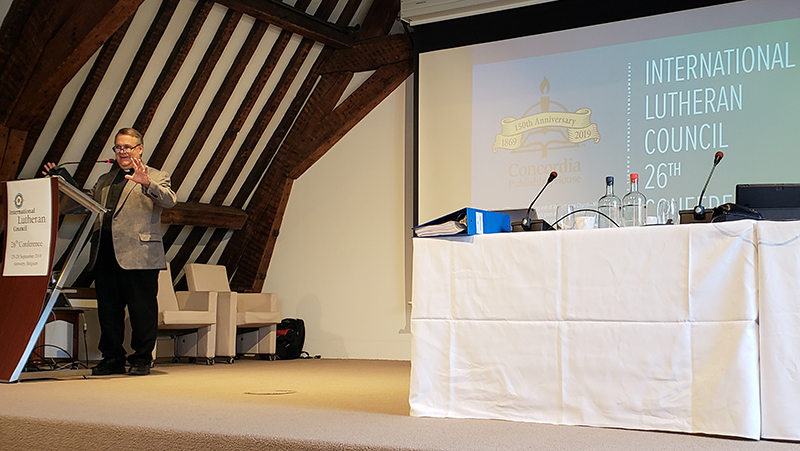
Rev. Dr. Lawrence Rast presents on the history of fellowship talks in the LCMS.
The morning also featured the next lecture on the theme of “Ecclesiology and Ecumenism.” Rev. Dr. Lawrence Rast (President, Concordia Theological Seminary in Fort Wayne, Indiana), gave a lecture entitled “Turning Points – A History of the Fellowship Issue in the Lutheran Church—Missouri Synod.” Dr. Rast examined the history of the LCMS’ approach to ecumenical relationships with others Lutherans, noting that its twin desire “to avoid both separatism/schism and unionism/syncretism” manifested itself in different ways in different contexts.
“How we determine or assess agreement in confession with other church bodies can vary from situation to situation,” he explained. “Given the vastly different situations that are increasingly encountered in today’s ecclesial context, it seems necessary and appropriate to avoid a ‘one size fits all’ approach and instead develop different ways of assessing agreement that are appropriate to the church body or group in question.” To that end, Dr. Rast invited conference attendees to discuss how the churches of the ILC might: (1) better appreciate the relevance of each church’s individual histories in inter-church discussions; (2) identify appropriate modes for assessing confessional agreement in different contexts; (3) consider different procedures by which altar and pulpit fellowship might be declared between churches; (4) examine the relationship between public confession and public membership in a church body; and (5) consider how we might relate to confessional groups within larger church bodies.
Delegates considered these questions in smaller World Region groups, with spokesmen sharing some of the results of their discussions with the wider conference afterwards.
ILC Growth and Dogmatics Presentation
The most prominent piece of business in the afternoon was the reception of new members into the International Lutheran Council. In total, the ILC voted to receive seventeen new church bodies as members, representing 4.15 million Lutherans across the globe (full story here).
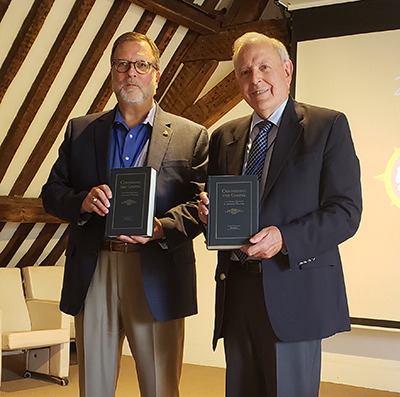
Dr. Bruce Kintz of Concordia Publishing House and Dr. Samuel Nafzger show the new dogmatics series from the LCMS.
Later in the afternoon, Rev. Dr. Samuel H. Nafzger spoke on the subject of dogmatics, noting the publication of a new two-volume dogmatics text from The Lutheran Church—Missouri Synod entitled Confessing the Gospel: A Lutheran Approach to Systematic Theology (published by Concordia Publishing House). Dr. Nafzger, who is editor of the series, formerly served as Executive Secretary of the ILC from 1993-2011. He also served as LCMS as director of the Commission on Theology and Church Relations from 1974-2008.
In his lecture, Dr. Nafzger outlined the multi-decade development of the series and detailed the “building blocks” approach which frames the book. Each chapter considers its subject from a variety of viewpoints, including its Scriptural Foundation and Confessional Witness, a Systematic Formulation, Historical and Contemporary Developments, and its Implications for Life and Ministry.
Every participant in the ILC’s 2018 World Conference will receive a copy of the new dogmatics series.
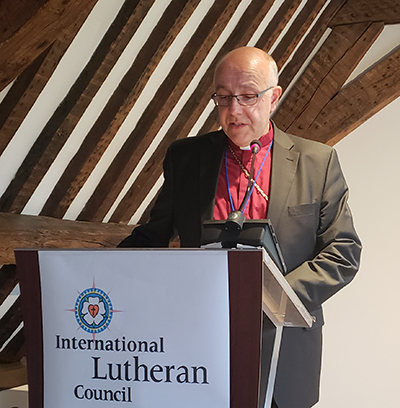
ILC Chairman Hans-Jörg Voigt gives his report.
The convention also heard the report of ILC Chairman Hans-Jörg Voigt, who framed his thoughts around the subject of the ILC’s ecumenical relations and the catholicity of the Lutheran Church. “Ecumenism and catholicity matter to us strongly,” he said. Drawing on the definition provided by Vincent of Lérins as adapted in the Lutheran tradition, Chairman Voigt defined catholicity as that which has been believed always, everywhere, and by all on the basis of Scripture. This understanding of catholicity gives us a platform for a “rightly understood ecumenism.” And because we have a
solid grounding in the Scriptures and the Confessions, he said, “we are strong enough to be open to ecumenical dialogue in our day.”
The rest of the afternoon was dedicated to regional meetings, and reports from World Areas, with the conference hearing reports from Asia, Africa, and North America.
A return to martyrdom
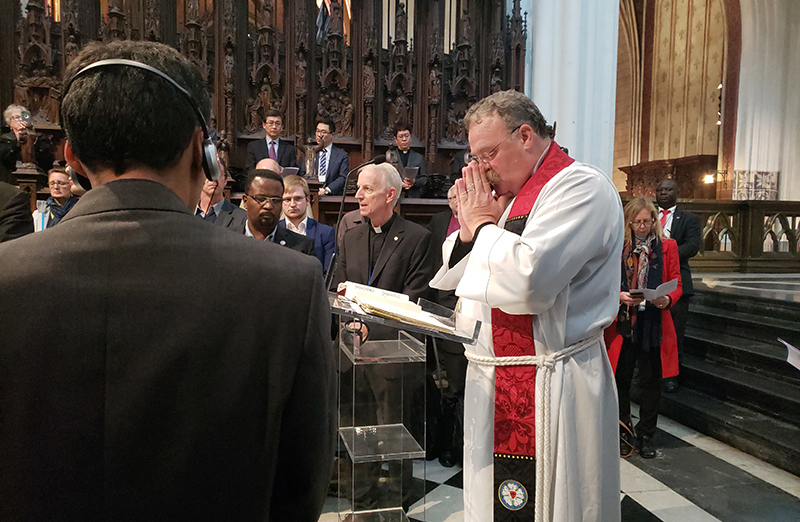
LCMS President Matthew Harrison prays in preparation before giving his sermon.
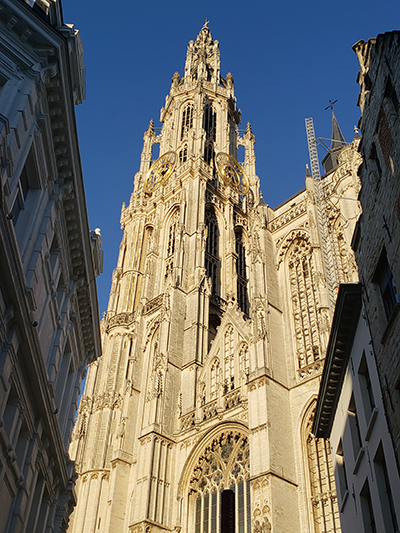
The Cathedral of Our Lady in Antwerp, Belgium.
The day ended, as it began, with a service reflecting on martyrdom. LCMS President Matthew C. Harrison preached a sermon reflecting on the martyrs Esch and Voes, tying their stories back to the work of Luther, to earlier martyrs in the Church, and finally to the great Martyr, Christ Himself. In the end, President Harrison explained, it is the sacrifice of Christ alone—His death and resurrection—which gives meaning to the deaths of all the other martyrs and to our own struggles to stand firm in suffering and opposition. For it is by the blood of Christ that we are saved.
The service was held in Antwerp’s Cathedral of our Lady, a place “touched by the Reformation and Counter-Reformation,” noted Vicar General Bruno Aerts, who welcomed the ILC to the church on behalf of the Roman Catholic Archdiocese of Antwerp. The building was subject to major iconoclastic attacks and destruction in 1566 by Calvinist iconoclasts. The church today is celebrated for its artistic beauty, including three major pieces by Peter Paul Rubens completed in the early 17th century.
President Gijsbertus van Hattem of the Independent Evangelical Lutheran Church in Belgium served as lector, while the organist and choir of the cathedral provided musical accompaniment for the service.
———————
